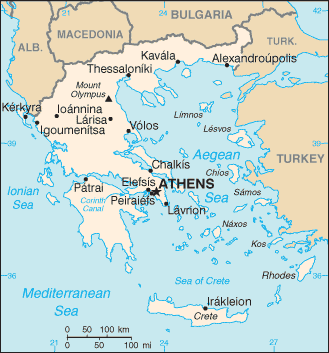Greece
Greece, officially called the Hellenic Republic (Greek: Ελληνική Δημοκρατία), is a country in the southeast of Europe on the southern tip of the Balkan peninsula. It has land boundaries with Bulgaria, the Former Yugoslav Republic of Macedonia, and Albania to the north; and with Turkey to the east. The waters of the Aegean Sea border Greece to the east, and those of the Ionian and Mediterranean Sea to the west and south. Regarded by many as the cradle of Western civilization and the birthplace of democracy, Greece has a long and rich history during which its culture has proven especially influential in Europe, Asia and Africa. The shores of Greece's Aegean Sea saw the emergence of the first civilizations in Europe, namely the Minoan and Mycenaean civilizations. After these, a Dark Age followed until around 800 BC, when a new era of Greek civilization emerged. This Greece of city-states established colonies along the Mediterranean and partially resisted Persian invasions. Greek culture would later become the basis of the Hellenistic civilization that followed the empire of Alexander the Great. Militarily Greece itself declined to the point that the Romans conquered the land (168 BC onwards), though Greek culture would in turn conquer Roman life. Greece became a province of the Roman Empire, but Greek culture would continue to dominate the eastern Mediterranean and when the Empire finally split in two the Eastern or Byzantine Empire, centered on Constantinople, would remain Greek in nature, as well as encompassing Greece itself. From the 4th century to the 15th century the Eastern Roman Empire survived eleven centuries of attacks from the west and east until Constantinople fell on May 29, 1453 to the Ottoman Empire. Greece proper had gradually been conquered by the Ottomans during the 15th century. The Ottomans ruled Greece until the early 19th century. In 1821, the Greeks rebelled and declared their independence, but did not succeed in winning it until 1829. The elites of powerful European nations saw the war of Greek independence, with its accounts of Turkish atrocities, in a romantic light. Scores of non-Greeks volunteered to fight for the cause--including, for example Lord Byron--and indeed at times the Ottomans seemed on the point of almost entirely suppressing the Greek revolution but for the threatened direct military intervention of France, England or Russia. The Russian minister for foreign affairs, Ioannis Kapodistrias, himself a Greek, returned home as President of the new Republic following Greek independence. That republic disappeared when a few years later Western powers helped turn Greece into a monarchy, the first king coming from Bavaria and the second from Denmark. During the 19th and early 20th centuries, in a series of wars with the Ottomans, Greece sought to enlarge its boundaries to include the ethnic Greek population of the Ottoman Empire, slowly growing in territory and population until it reached its present configuration in 1947. In World War I, Greece sided with the entente powers against Turkey and the other Central Powers. In the war's aftermath, the Great Powers awarded parts of Asia Minor to Greece, including the city of Smyrna (known as Izmir today) which had a large Greek population. Despite the country's numerically small and ill-equipped armed forces, Greece made a decisive contribution to the Allied efforts in World War II. At the start of the war Greece sided with the Allies and refused to give in to Italian demands. Italy invaded Greece on 28 October 1940, but Greek troops repelled the invaders after a bitter struggle. This marked the first Allied victory in the war. Hitler then reluctantly stepped in, primarily to secure his strategic southern flank: troops from Germany, Hungary, Bulgaria and Italy successfully invaded Greece, overcoming Greek, British, Australia and New Zealand units. During years of Nazi occupation, thousands of Greeks died in direct combat, in concentration camps or of starvation. The occupiers murdered the greater part of the Jewish community despite efforts by the Greek Orthodox Church and many Christian Greeks to shelter Jews. The economy languished. After liberation, Greece experienced an equally bitter civil war—between communists and royalists—that lasted until 1949.
In the 1950s and 1960s, Greece continued to develop slowly, initially with the help of the U.S.A Marshall Plan granst and loans, and later through growth in the tourism sector. In 1967, the Greek military seized power in a coup d'état and overthrew the right-wing government of Panayiotis Kanellopoulos and established what became known as the Régime of the Colonels. The Central Intelligence Agency was suspected in involvement in the coup. The new regime in Athens was supported by the U.S.A. In 1973, the régime abolished the Greek monarchy. In 1974, dictator Papadopoulos denied help to the USA and rumor has it that as a result the US, through Kissinger long arm, created a second coup. Colonel Ioannides was appointed as the new head-of-state. Since the restoration of democracy, the stability and economic prosperity of Greece have grown. Greece joined the European Union in 1981 and adopted the Euro as its currency in 2001. New infrastructure, funds from the EU and growing revenues from tourism, shipping, services, light industry and the telecommunications industry have brought Greeks an unprecedented standard of living. Tensions continue to exist between Greece and Turkey over Cyprus and the delimitation of borders in the Aegean Sea but relations have considerably thawed following successive earthquakes - first in Turkey and then in Greece - and an outpouring of sympathy and generous assistance by ordinary Greeks and Turks. The 2004 Summer Olympics took place in the country of their birth to widespread praise and satisfaction.
This article is licensed under the GNU Free Documentation License. It uses material from the Wikipedia article "Greece". |
||||||||||

